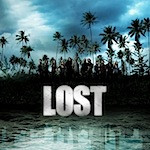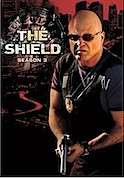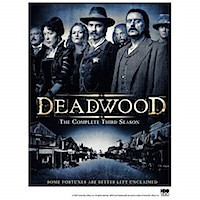Category Archives: Law and Order
Series Finales: the Good, the Bad, and the Ugly
Let’s talk about endings today. I’ve been in a bit of a fugue state since LOST concluded on Sunday night. Endings tend to be bittersweet, and this one got me mulling over the final episodes of some of my other all-time favorite shows. Fans of LOST, THE SHIELD, THE WIRE, LAW & ORDER, SEINFELD, THE SOPRANOS, and SIX FEET UNDER, here’s your warning: if you haven’t seen the final episode of these series yet, there are spoilers ahead…
I became hooked on LOST early on. Over the past six seasons it was sometimes fantastic, occasionally maddening, and always puzzling. At the moment, how to draw something to a close is a particularly relevant subject for me, since I recently finished the fourth book in my series. All of those books have primarily focused on the arc of two characters, and with this final book, that arc needed to draw to a close. Mind you, I’m not done with the series, but the focal point will shift with the next book. Because of that, I really wanted to wrap things up in a way that was ultimately satisfying (although not necessarily “happy”). It’s a challenge that most series face. Some rise to the occasion, others fall flat.
So here’s my rundown of the best and worst television series finales. Feel free to chime in on what you thought of each:
- LOST: To be honest, I didn’t have high expectations for this finale. I knew going in that there were so many dangling threads, there was simply no way the writers would be able to tie them all up. Yet I was pleasantly surprised. What I think they gave us, in the end, was viscerally satisfying. The characters that we’ve grown to care about all completed their journey, there were some nice tie-ins to incidents going all the way back to the pilot. That initial episode concluded with Jack saying, “If we can’t live together, we’ll die alone.” As it turned out, living together meant that when they did die, they weren’t alone. The finale didn’t answer every lingering question (what was the island after all? Just a giant MacGuffin?) but it managed to deliver what the show has alway
 s provided in its best moments. Since the debut it was an emotional ride, focused on the characters and the journey they’ve undertaken together. It provided enough answers to give some satisfaction, while still leaving quite a bit open to debate. I suspect that if the writers had known from the outset how many episodes total they’d have to play with, it would have been a much tighter story arc. But alas, that’s not how the world of TV works. Going in, they never could have guessed what a hit the show would become, and how many slavering fans would dissect every scene. That being said, I think they did a great job. In the end the series shone a light on the true meaning of love and friendship, redemption, and mortality. Some people complained that it was mawkish and maudlin. For me, the sentimentality worked. After all, I’d spent years with these characters. I cared about what happened to them. I wanted things to work out for them- and based on my interpretation of the finale, it did.
s provided in its best moments. Since the debut it was an emotional ride, focused on the characters and the journey they’ve undertaken together. It provided enough answers to give some satisfaction, while still leaving quite a bit open to debate. I suspect that if the writers had known from the outset how many episodes total they’d have to play with, it would have been a much tighter story arc. But alas, that’s not how the world of TV works. Going in, they never could have guessed what a hit the show would become, and how many slavering fans would dissect every scene. That being said, I think they did a great job. In the end the series shone a light on the true meaning of love and friendship, redemption, and mortality. Some people complained that it was mawkish and maudlin. For me, the sentimentality worked. After all, I’d spent years with these characters. I cared about what happened to them. I wanted things to work out for them- and based on my interpretation of the finale, it did. - THE WIRE: Still, hands down, the best show ever produced for television. And the conclusion delivered. As always with this show, things weren’t tied up with a neat bow, because real life isn’t like that. But we saw the torch being passed to a younger generation, for better and for worse. We saw redemption for McNulty, justice for Daniels, and Bubs getting a new lease on life. This was probably my favorite series finale ever. Well done across the board.
- THE SHIELD: Tough one here. I loved the show from the outset for the moral gray area that all of the characters occupied. Like the WIRE, it felt more real than the vast majority of police dramas. It was never as simple as the good guys vs. the bad guys,
 because every character possessed the capacity for both good and evil acts (even Dutch: remember him strangling that cat?) And the conclusion here was grim. In the end, Vic Mackey ended up losing his family and friends, stuck in a day job that was for him a living hell, with all of his crimes brought to light. Things didn’t really end well for most of the characters we cared about: they were either dead, in jail, or alone and isolated. It was the furthest thing from a happy ending, yet it was satisfying, because there was a sense that justice had been done, and everyone ended up paying the price for it.
because every character possessed the capacity for both good and evil acts (even Dutch: remember him strangling that cat?) And the conclusion here was grim. In the end, Vic Mackey ended up losing his family and friends, stuck in a day job that was for him a living hell, with all of his crimes brought to light. Things didn’t really end well for most of the characters we cared about: they were either dead, in jail, or alone and isolated. It was the furthest thing from a happy ending, yet it was satisfying, because there was a sense that justice had been done, and everyone ended up paying the price for it. - SIX FEET UNDER: This finale if right up there for me. The final few minutes in particular, when Claire was driving away from her family to start a new life, interspersed with flash forwards that tied in so nicely to the opening of every episode, were sheer genius. Viewers witnessed the death of every major character in a sort of time-lapse montage video: some demises were funny, others tragic or mundane. Thanks to those snapshots of their future lives, it was probably the most satisfying series ending I’ve ever seen.
- LAW & ORDER: I just watched this last night. I’m not sure if the writers were aware that this particular episode would mark the end of the second longest-running drama on television. Either way, I like that they didn’t over do it. Most of the episode was just like any other installment, although this time (interestingly enough) there was no actual homicide (and if you’re going to get picky, no real reason for Lupo and Bernard to be investigating a potential terrorist threat. But I digress). The final scene with the lieutenant was heartwarming, although the great strength of the show was that viewers were left largely unaware of the personal lives of the characters. You were treated to tantalizing tidbits here and there, but the focus always remained firmly on their work lives (this is why they were able to keep going for twenty years despite a slew of cast changes, in my opinion).
Now, on to some finales that disappointed.
- I realize that this is probably going to spark some debate, but I was one of the people who really loathed THE SOPRANOS finale. There were many far more interesting things they could have done, as opposed to that surreal, disjointed final scene in the diner (Speaking of which, if you missed the LOST alternate endings o
 n Jimmy Kimmel, see them here. Brilliant). The writers could have gone back to the pilot, bringing back those damn ducks. They could have had that Russian finally wander back out of the woods (speaking of threads that were never tied up). While I appreciated that they ended with the family, which is largely what the show was about, I still felt let down.
n Jimmy Kimmel, see them here. Brilliant). The writers could have gone back to the pilot, bringing back those damn ducks. They could have had that Russian finally wander back out of the woods (speaking of threads that were never tied up). While I appreciated that they ended with the family, which is largely what the show was about, I still felt let down.
- SEINFELD: Terrible. Just awful. Having the characters end up in jail was absurd, and not in the trademark manner of the rest of the show. It felt forced, nasty, and just plain silly. Worse yet, there was nothing funny about it- which is downright criminal for the conclusion of one of the all-time funniest sitcoms. I have never been more disappointed by the end of a series.
- DEADWOOD: This show ended prematurely, and on a flat note thanks to some serious missteps by HBO. It’s a shame that they’ll probably never be able to get everyone together again for that hinted-at film that was supposed to make up for it. What started with a roar ended with a whimper.
So I’d love to hear what you think of these, and other shows I might have missed. Who did it well? Which finales bombed?
Never Look Back
Yesterday, Joe discussed knowing where you’re headed before getting started. I received an email from a college friend this week who’s writing his first novel, and he asked me a few questions about my process. I thought I’d share some of what I said in reply. Of course, there is no one “right way” to write a book; everyone has to find his or her own path. But after hammering out four books, I’ve learned what works for me.
novel, and he asked me a few questions about my process. I thought I’d share some of what I said in reply. Of course, there is no one “right way” to write a book; everyone has to find his or her own path. But after hammering out four books, I’ve learned what works for me.
1) At what point do you seek formal feedback, rather than just cranking it out?
I don’t show my work to anyone until I’ve completed two drafts. And then I send it to my “Beta readers,” 5-7 people whose opinion I trust. What I’ve discovered, however, is that they’ll all like different aspects of the story, and they’ll all criticize different aspects. I always take that feedback with a grain of salt. If more than one person is saying the same thing, I know it’s time to go back and figure out where I went wrong.
In Boneyard, one of my readers was so taken with a character in the initial chapter, she felt strongly he should be incorporated into the rest of the storyline. I had fleshed out that character fairly well, so that when something happened to him, you’d fear for his well-being. But ultimately, he was a device to kickstart the plot. Think of it as the garbage men who find a body in a dumpster in the first five minutes of Law and Order. You don’t expect to see the garbage men help track down the killers, or try the accused–they’re there to find the body, then they’re gone. Same with this character. No one else had that comment, so I chose to limit him to that opening chapter.
2) Do you counsel quantity (ie, getting more on paper) over quality (tweaking sentences) early on?
In my opinion what separates published authors from people who have been working on a book for years without completing it is this: never look back. I don’t start editing–at all–until the entire book is written. A lot of people get fifty pages in, then go back and start editing chapter one. The danger in this is that while you might end up with a perfect first fifty pages, by the time you finish those there’s a good chance you’ve lost the thread of the story.
It’s also discouraging to suddenly realize you’ve spent three months on fifty pages, and another three hundred and fifty remain to be written (of course, that’s discouraging whether you’ve stopped or not–I call it the “interminable middle”). I never even re-read what I’ve written until I’ve finished the first draft. (I also spend most of that draft thinking that what I’m writing is the worst junk ever committed to page. But I forge ahead, because I know the next draft will be better.) And then when I do go back, the bones of the story are in place.
3) When does it help to have a literary guide (agent? editor? coach?)? How do you get a good one to take you seriously?
Start the agent search only when your manuscript is as absolutely perfect as it’s ever going to be. That means a minimum of three drafts. And after completing each draft, put it away for a month before looking at it again. That gives you a fresh perspective.
Resign yourself to the fact that the agent search might take months- not always the case, but frequently enough that it’s good to be prepared for it. And not hearing back right away doesn’t necessarily mean you’re going to be rejected. My first agent asked for an exclusive on the full manuscript right away–then three months passed. If I had to do it over, I’d probably call after a month and ask if it was all right for me to submit to other agents. In the end it worked out for me, but I was gnawing my nails to the quick that entire time. A month is more than enough time for an agent to have an exclusive.
Begin by querying your 3-5 top choice agents, always making sure that a) they’re currently acquiring manuscripts, and b) they represent the kind of work you write (these seem like givens, but you’d be surprised). There are a lot of good books on querying an agent (my favorite is Noah Lukeman’s “The First Five Pages”). Your query letter needs to be perfect, as do your first five pages, since that’s what an agent reads to make a snap judgement on your work. I loved what people were saying yesterday about switching the second chapter with the first. About a year ago, I read a tremendous manuscript written by a friend. And the entire first chapter I was yawning-not good for a thriller. It was all back story: how the protagonist got his job, where he went to school, his mother’s medical condition…then, scene two kicked in. The main character picked up a woman home at a bar, was accosted in his apartment by Russian mobsters, was threatened with blackmail and suddenly boom- we were off and running. Telling too much at the outset is a common mistake. Bear in mind you have 100,000 words to develop your characters, so there’s no need to overdo it at the outset. (By the way, this excellent book- FREEFALL, by Reece Hirsch- found representation and will be published next year).
Your agent shops the manuscript to editors. Very few publishers accept unsolicited manuscripts these days.
Getting an agent is hard. My best advice would be to go to a writing conference that good agents are attending- a face to face meeting goes a long way toward getting you out of the slush pile. Incidentally, Thrillerfest is hands down one of the best for finding an agent for a thriller- I can’t think of another conference that gathers forty top agents in one place to hear pitches. Well worth the investment if your manuscript is ready.
4) Not a question but an observation — I can’t seem to help harvesting the real lives and personalities of friends and acquaintances. Ringing in my ears is Elizabeth Gilbert: “Tell the truth. Tell the truth. Tell the truth.”
I suppose my personal life infiltrates the storylines in some places–but it depends on what I’m writing. For the screenplay I’m working on right now, my co-writer and I are drawing heavily on our life experiences. But for my series, much of it is pure creation-I’ve never defused a dirty bomb, chased down a suspect, or done many of the other things my characters do. I just imagine what it would be like, basing it on research and discussions with people who do those sorts of things for a living. So the old, “write what you know” has never been something I strongly adhered to. Otherwise I’d write about sitting alone in a room typing day after day. And trust me, that is rarely exciting.

